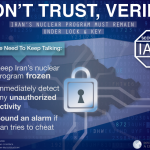Six years ago this week in Prague you gave hope to the world when you spoke “clearly and with conviction” of “America’s commitment to seek the peace and security of a world without nuclear weapons.”1 Later that year, your promotion of nuclear non-proliferation was cited when you were awarded the Nobel Peace Prize.
Arms Control after New START
On April 8th 2010, President Obama and President Medvedev signed New START, a nuclear weapons treaty designed to increase transparency and decrease deployed nuclear forces. While tension between Russia and the U.S. has inhibited diplomatic engagement on most issues, both countries are still working towards the agreed goal of 1550 deployed strategic nuclear warheads by February 2018. But as we celebrate the national security benefits of New START, looking past the agreement towards the future of nuclear arms control requires a crystal ball.
Six Years Post-Prague
Don’t worry, defense hawks – U.S. has more deployed nukes than Russia again
US-Russia Arms Control Treaty- New START 4th Anniversary

Last week marked the 4 year anniversary of New START, the most recent arms control treaty responsible for further reductions to the bloated nuclear arsenals of both the United States and Russia. The treaty is a landmark agreement, demonstrating the value of diplomacy and the ability to increase security while simultaneously reducing both nuclear weapons and spending.



